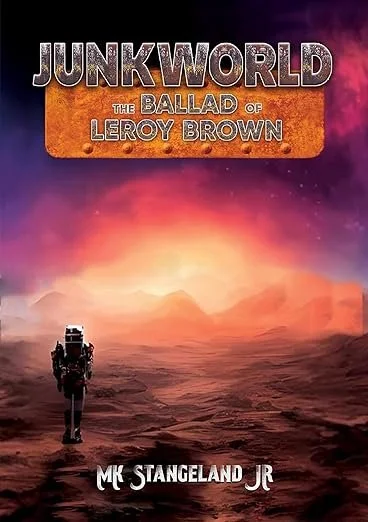Book Review- Junkworld: The Ballad of Leroy Brown by M.K. Stangeland
Junkworld takes readers to a planet where discarded machines are left to rust, creating a distinctive, scrapyard-style setting for a robot-led sci-fi tale. The premise is intriguing: champion fighting robot Leroy Brown, fresh from his latest victory, unexpectedly finds himself stranded on Junkworld. Convinced it’s all a mistake, Leroy’s goal is simple – get home.
Things take a turn with the arrival of the Top Dog, a tyrant intent on conquering all of Junkworld. For reasons that aren’t immediately clear, the Top Dog makes capturing Leroy a top priority. This personal interest pulls Leroy into the planet’s political struggles, forcing him to balance his own desire to leave with the role others expect him to play in resisting the Top Dog’s rule.
The worldbuilding has its strengths, particularly in the way the author describes the mechanical wasteland of Junkworld. The descriptions of the environment are often vivid enough to picture, and the idea of a world entirely populated by machines does set it apart from more conventional human-focused sci-fi. However, while the setting feels unique, there are moments where it could have been explored in more depth to add greater weight to the story.
The plot is straightforward, driven mainly by action sequences and Leroy’s attempts to evade capture. These scenes are fast-moving and easy to follow, though they sometimes lean heavily on repetition. The decision to make all the characters robots means that the battles avoid graphic violence, which makes the book accessible to younger readers as well as adults. That said, the action, while frequent, doesn’t always deliver the tension or impact that might keep readers fully hooked.
Characterisation is serviceable, with Leroy presented as a capable but occasionally one-note protagonist. He’s likeable enough to root for, but his motivations remain fairly narrow for much of the book. The Top Dog is an effective antagonist in terms of driving the plot, though his reasoning and depth are only revealed gradually – and even then, may leave some readers wanting more.
The story’s pacing is generally brisk, which works in its favour, but it sometimes comes at the cost of emotional engagement. There are a few twists along the way that add variety, though they may not surprise seasoned sci-fi readers. The final act raises the stakes and offers a resolution, but it feels more functional than memorable, wrapping up the main threads without leaving a lasting punch.
Overall, Junkworld is a readable, uncomplicated sci-fi adventure with a distinct setting and a clear through-line. It’s not without its shortcomings – the character depth, world exploration, and narrative tension could all be stronger – but it delivers enough movement and mechanical mayhem to pass a few enjoyable hours. Best suited for readers who enjoy light, action-led sci-fi and aren’t looking for anything too heavy or complex.


